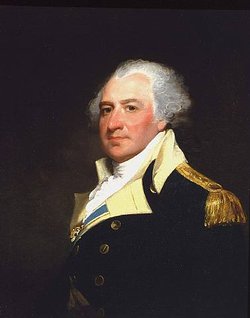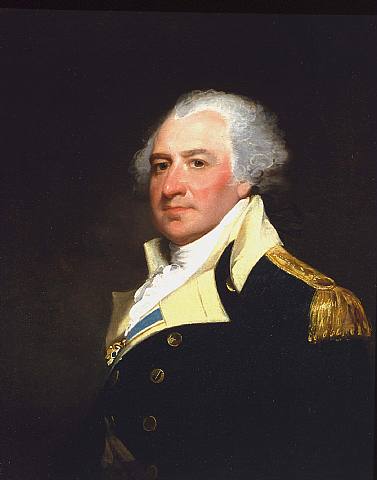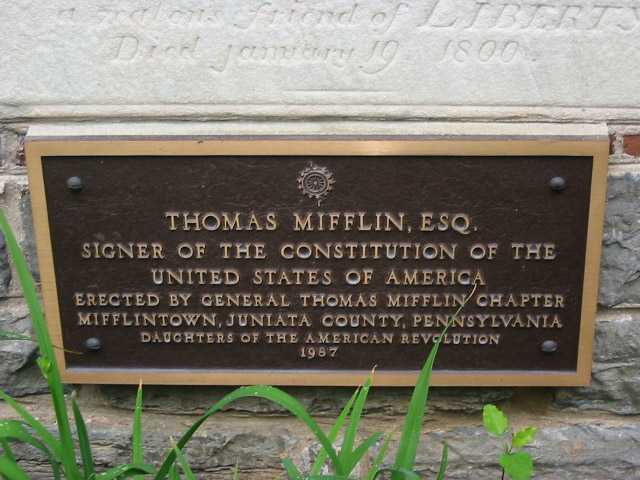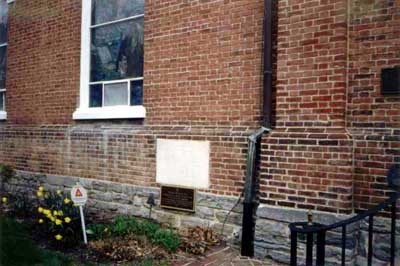In spite of being born into a Quaker family, this Philadelphia native was one of the Revolution's most radical promoters. After graduating, at the age of 16, from what is today the University of Pennsylvania, he became a successful entrepreneur and socially excelled, becoming a member of the prestigious American Philosophical Society. His success as a merchant led him to despise the taxes put on the American colonists by England and motivated him to become involved in politics.
In 1774, his fellow Pennsylvanians sent him to the Continental Congress. After the Battle at Lexington, he resigned his seat in order to recruit and train troops for the Patriot cause. His zeal caught the attention of other Patriot leaders and, in August of 1775, George Washington selected him as the Continental Army's first Quartermaster General.
He performed those duties faithfully and adequately, but desired to see action on the front line, so he asked to be reassigned. He was temporarily moved to other duties, but in the fall of 1776, the Continental Congress persuaded him to return to his quartermaster duties, because a suitable replacement could not be found. In 1777 and 1778, he was part of a three-man commission assembled to study how the Army could be more effective. Some of their recommendations angered Mifflin's political enemies, and soon Congress was calling for an inquiry on charges that, as Quartermaster General, he embezzled funds and misused assets. The Major General resigned his position and encouraged an open and complete investigation. The inquiry never happened. Although the accusations may have damaged his reputation, nationally he was still popular in his home state.
Voters sent him to the Pennsylvania legislature in 1778, returned him to the Continental Congress from 1782 to 1784, then brought him back to the state legislature where he served as the Speaker of the Pennsylvania House of Representatives from 1785 to 1788. In 1787, he was selected as a delegate to the Constitutional Convention in Philadelphia where he called for a balance between national and state powers.
From 1790 to 1799, he served as governor. As Pennsylvania's first chief executive, he improved roads, strengthened the state militia, and presided over the committee that wrote Pennsylvania's first Constitution. After three terms as governor, the voters returned the statesman to the state legislature where he served until his death.
His service to his nation was important to her growth and development, but financially took a toll on the once-wealthy businessman. By the end of his life, Mifflin's finances were so unsettled that he had to buried at state expense.
In spite of being born into a Quaker family, this Philadelphia native was one of the Revolution's most radical promoters. After graduating, at the age of 16, from what is today the University of Pennsylvania, he became a successful entrepreneur and socially excelled, becoming a member of the prestigious American Philosophical Society. His success as a merchant led him to despise the taxes put on the American colonists by England and motivated him to become involved in politics.
In 1774, his fellow Pennsylvanians sent him to the Continental Congress. After the Battle at Lexington, he resigned his seat in order to recruit and train troops for the Patriot cause. His zeal caught the attention of other Patriot leaders and, in August of 1775, George Washington selected him as the Continental Army's first Quartermaster General.
He performed those duties faithfully and adequately, but desired to see action on the front line, so he asked to be reassigned. He was temporarily moved to other duties, but in the fall of 1776, the Continental Congress persuaded him to return to his quartermaster duties, because a suitable replacement could not be found. In 1777 and 1778, he was part of a three-man commission assembled to study how the Army could be more effective. Some of their recommendations angered Mifflin's political enemies, and soon Congress was calling for an inquiry on charges that, as Quartermaster General, he embezzled funds and misused assets. The Major General resigned his position and encouraged an open and complete investigation. The inquiry never happened. Although the accusations may have damaged his reputation, nationally he was still popular in his home state.
Voters sent him to the Pennsylvania legislature in 1778, returned him to the Continental Congress from 1782 to 1784, then brought him back to the state legislature where he served as the Speaker of the Pennsylvania House of Representatives from 1785 to 1788. In 1787, he was selected as a delegate to the Constitutional Convention in Philadelphia where he called for a balance between national and state powers.
From 1790 to 1799, he served as governor. As Pennsylvania's first chief executive, he improved roads, strengthened the state militia, and presided over the committee that wrote Pennsylvania's first Constitution. After three terms as governor, the voters returned the statesman to the state legislature where he served until his death.
His service to his nation was important to her growth and development, but financially took a toll on the once-wealthy businessman. By the end of his life, Mifflin's finances were so unsettled that he had to buried at state expense.
Bio by: Bigwoo
Family Members
Advertisement
See more Mifflin memorials in:
Explore more
Sponsored by Ancestry
Advertisement






